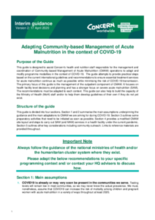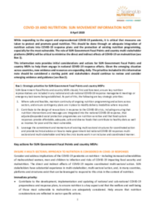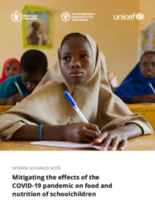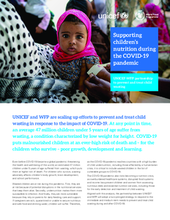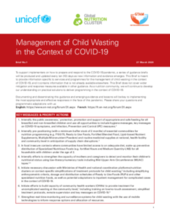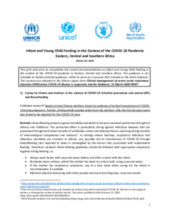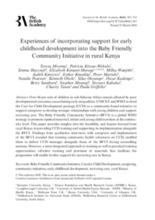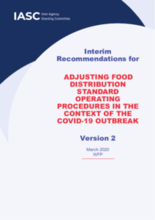Displaying 31 - 40 of 243
This guide is designed to assist Concern's health and nutrition staff responsible for the management and coordination of Community-based Management of Acute Malnutrition (CMAM) operations to adapt and modify programme modalities in the context of COVID-19.
This systematic review aimed to explore if and how the voices of young people in out-of-home care (OoHC) are represented in research examining their health.
This information note provides initial considerations and actions for Scaling Up Nutrition (SUN) Government Focal Points and country multi-stakeholder platforms (MSPs) to help them engage in national COVID-19 response efforts to protect and promote good nutrition.
This joint note is aimed at providing preliminary guidance to national and local authorities, school administrators and staff and implementing partners on how to take short-term measures to support, transform or adapt school feeding programmes in their efforts to safeguard the food security and nutritional status of school-aged children during the COVID-19 pandemic.
This two-page brief outlines the UNICEF-WFP partnership's two-pronged strategy to respond to the immediate and medium-term needs to prevent and treat child wasting during and after COVID-19.
This Brief is meant to provide information specific to services and programmes for the management of child wasting in the context of COVID-19, and it contains information that is not already available elsewhere.
This joint note aims to consolidate the current recommendations on Infant and Young Child Feeding in the context of the COVID-19 pandemic in Eastern, Central and Southern Africa.
This paper provides insights into the feasibility and lessons learned from rural Kenya in providing Care for Child Development (CCD) training and supporting its implementation alongside the Baby Friendly Community Initiative (BFCI).
This document aims to guide the revision of existing Standard Operating Procedures (SOPs) for Food Distribution in the COVID-19 context at the country level to minimize the risk of exposure of personnel, partners and beneficiaries.
This resource document collates available guidance and tools on the Novel Coronavirus Disease (COVID-19) to assist Nutrition in Emergencies (NiE) practitioners in integrating COVID-19 preparedness and response into humanitarian nutrition responses.

